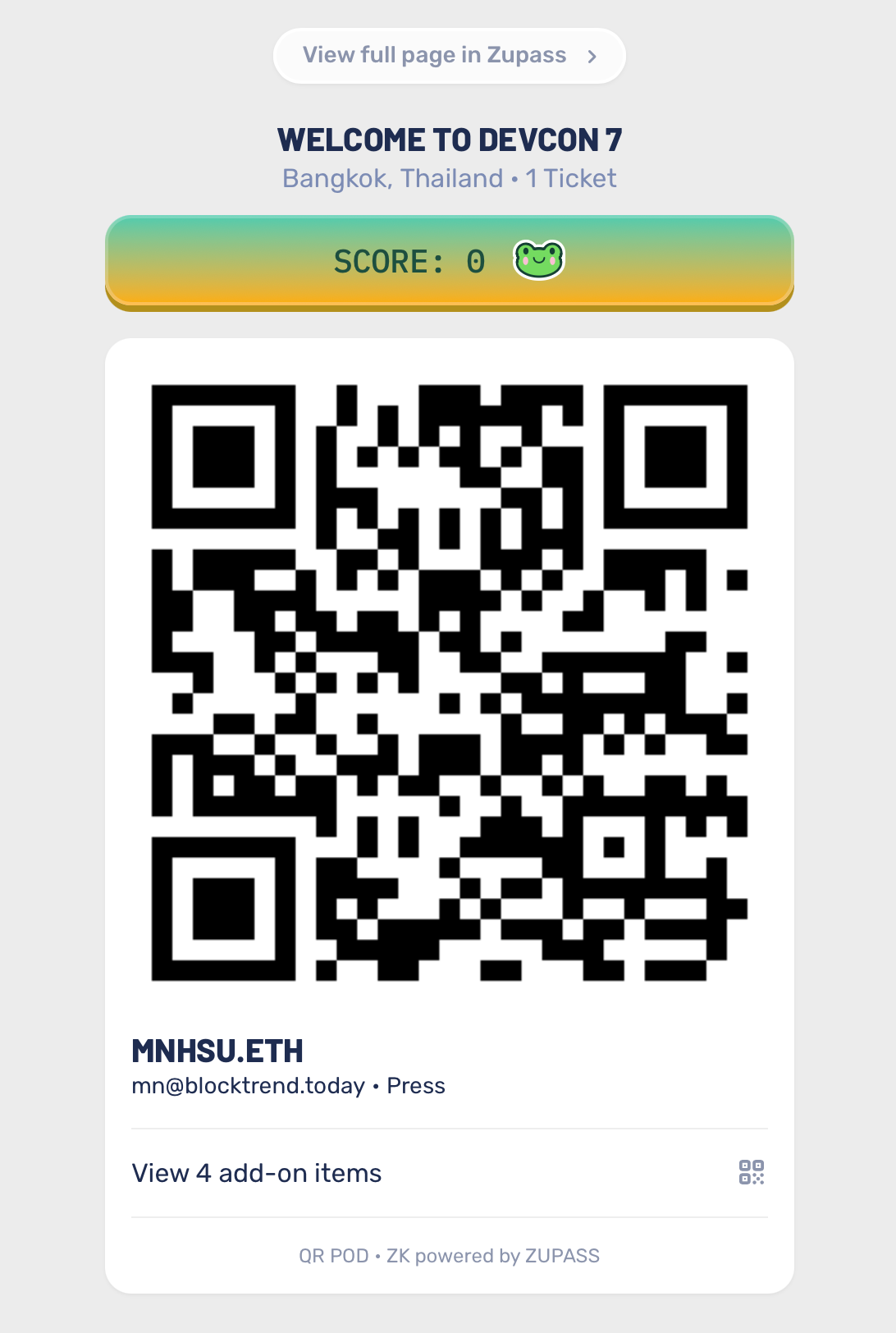GM,
This article, also written in Bangkok, shares my firsthand insights from attending the 2024 Ethereum Developer Conference (Devcon7). In one sentence: “Blockchain should be this simple.”
Zero-Knowledge Proof Tickets
Devcon7 is the most accessible Ethereum Developer Conference to date! Ethereum’s ecosystem has finally moved beyond foundational infrastructure, and developers are now building decentralized applications that are user-friendly for everyone. You can feel this shift starting from the event tickets.
Below is a screenshot of my ticket. The QR code hides an impressive tech: it’s powered by Zupass, a ticketing app integrated with zero-knowledge proof technology. The organizers explained in an email that Zupass uses the Semaphore V4 protocol and thoughtfully included a link to learn more. But I chose not to open it—I wanted to test if skipping that step would impact my entry on the event day. Care to guess how it went?
Of course, entry went smoothly! During the entire check-in process, I couldn’t even tell there was any sophisticated technology behind it—honestly, it made me wonder if it truly protected privacy. But that’s a question only tech enthusiasts would delve into; the organizers already had answers. For most people, the key concern was simply getting in without a hitch. No matter how “impressive” the technology, it should never complicate check-in.
The zero-knowledge proof ticket was just for redeeming a wristband, which became the real access pass throughout the event. Since the venue was large with multiple entrances, using the QR code each time would have created long lines just for people to pull out their phones and display a code.
Beyond the seamless ticket experience, one of the biggest surprises was that I’ve received zero physical business cards so far. I haven’t even seen anyone exchanging cards at any of the sessions.
On-Chain Business Cards
In recent years, I’ve rarely brought business cards to public events, but I had started to relent, realizing that people still tend to use cards to network and make connections. Coming to Devcon, I was surprised and delighted to find thousands of people doing the same—avoiding business cards entirely! Most people just swap Telegram contacts and take a selfie together to remember where they met.
However, this experience still differs from traditional business card exchanges, and once Devcon ends, it’ll be back to the usual. That’s why I’m particularly impressed by an on-chain business card application here. ENS provided every participant with a free custom badge on-site. Besides a personalized design, the badge has NFC functionality, so others can simply tap their phones to receive my on-chain business card (POAP) directly to their wallet.
The ritual of exchanging business cards has shifted from pulling out varied, textured paper cards to simply using a phone to scan someone’s digital badge. The layout of digital business cards is limitless: you can change your profile picture anytime, add a video if you like, and link directly to your social media, company website, and messaging accounts—no need to print digital information onto paper anymore.
This is, in my opinion, the ideal application, and also the ultimate challenge for developers. Simplicity is the peak of complexity; only by maintaining familiar behaviors can we produce better results.
The Devcon event tickets and ENS on-chain business cards are both groundbreaking technological innovations, but they’re currently still in the testing phase within the crypto community’s own events and haven’t yet crossed into mainstream applications. Part of the reason is that few people realize that Ethereum’s infrastructure is now mature enough to support thousands of users, as demonstrated at Devcon.
Emerging from the Infrastructure Phase
One of the most iconic moments of every Devcon opening ceremony is when Ethereum founder Vitalik Buterin reintroduces Ethereum to everyone.
This year, Vitalik’s talk highlighted three major achievements of Ethereum:
Upgrading from PoW to PoS
Guiding users from L1 to L2
Becoming more decentralized than other blockchains
However, he also pointed out that Ethereum still faces several challenges. The most urgent include a suboptimal user experience and a lack of diverse applications beyond finance. While Ethereum is already relatively decentralized, Vitalik believes it could go further by lowering staking requirements and reducing hardware needs to deepen its decentralization. Additionally, there’s the looming challenge of quantum attacks to consider.
Back in 2017, when I first attended Devcon3 online, I could barely understand what the speakers on stage were talking about, and it gave me the impression that Devcon was a "developer-only" conference with little relevance for users. But Devcon7 could very well be a turning point. From the talks on stage to the hands-on experiences off-stage, the message is clear: Ethereum has emerged from its infrastructure phase and is now ready to integrate into daily life.






